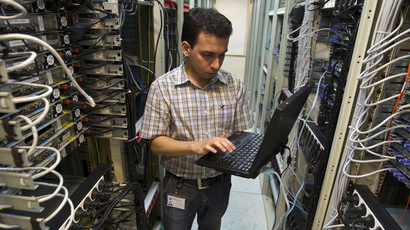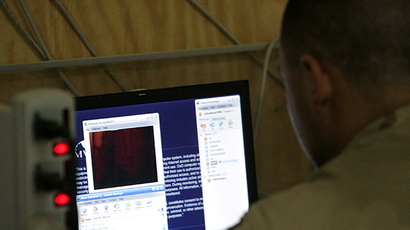‘Press handling with talking heads’: Snowden files reveal enormous GCHQ efforts to escape legal challenge
The UK’s spy agency GCHQ was doing whatever it could to avoid igniting a “damaging public debate” and a subsequent possibility of a legal threat over its surveillance practices and cooperation with telecoms, new Snowden papers reveal.
The documents leaked to the Guardian by former NSA contractor and
whistleblower Edward Snowden illustrate how the Government
Communication Headquarters feared the possibility of being
challenged under the Human Rights Act if details of privacy
invasions leaked.
The intelligence agency also attempted to keep the lengths to
which telecommunications agencies had gone to concealed. It was
found that they gone “well beyond” the legal requirements
in aiding intelligence agencies in their procuring of data – not
only in the UK but overseas too.
The memos show how GCHQ attempted to prevent intercepted
communication to be used as evidence in UK criminal trials:
something all three main political parties have been advocates
of, but the intelligence community very much against.
The most recent was an attempt by the Labour government, whose
proposal was obstructed in 2009 by GCHQ, MI5 and MI6 which,
according to the documents, feared a potentially
“damaging” public debate, “which might lead to legal
challenges against the current regime.”
In May 2012, a further document illustrated the risks the British
intelligence services would be susceptible to should their
interceptions be made admissible. Documents seen by the Guardian
demonstrate a sincere fear of “the damage to partner
relationships if sensitive information were accidentally released
in open court” and how the “scale of interception and
retention required would be fairly likely to be challenged on
Article 8 (Right to Privacy) grounds.”
The GCHQ also assisted the Home Office with waging the PR war
over the “intercept as evidence” reform, by “lining up
talking heads (such as Lord Carlisle [sic], Lord Stevens, Sir
Stephen Lander, Sir Swinton Thomas)," according the leaked
memo.

“We are working closely with HO [Home Office] on their plans
for press handling when the final report [on intercept as
evidence without classification] is published,” the document
reads.
When it was revealed in earlier Snowden files that telecom
companies help the government intercept personal data, telecoms
claimed they were only complying with the law. However, a secret
document prepared in 2009 by a joint working group of GCHQ, MI5
and MI6, cited by the Guardian, suggests more voluntary
cooperation.
Since telecoms could easily move their operations out of
jurisdiction to avoid legal problems, “it has been necessary
to enter into agreements with both UK-based and offshore
providers for them to afford the UK agencies access, with
appropriate legal authorisation, to the communications they carry
outside the UK," the document says.
Telecoms in their turn kept their cooperation with the UK
government secret over the fears of “damage to their brands
internationally,” the GCHQ memo said.
The leaked document did not specify which companies might have
voluntarily joined the GCHQ’s Tempora surveillance project, under
which the UK's spying agency intercepts and stores for 30 days
huge volumes of data – like emails, social network posts, phone
calls and much more, culled from international fiber-optic cables
– which they openly share with their American partners.
Meanwhile, following a wave of revelations about the NSA spying
not only on ordinary citizens but also on world leaders, the EU leadership issued a joint statement saying the partnership with
America should be built on respect and trust.
France and Germany are planning to seek bilateral talks with the
US “with the aim of finding before the end of the year an
understanding on mutual relations,” while Brazil is pushing
for the adoption of a UN General Resolution that promotes the
right of privacy on the internet.














